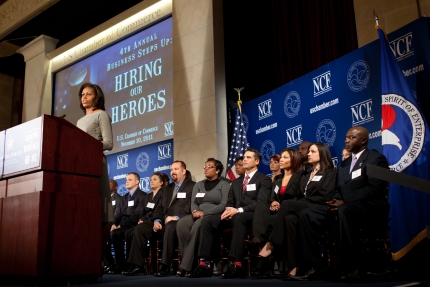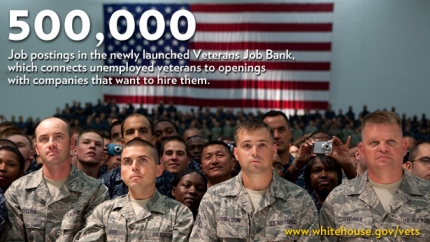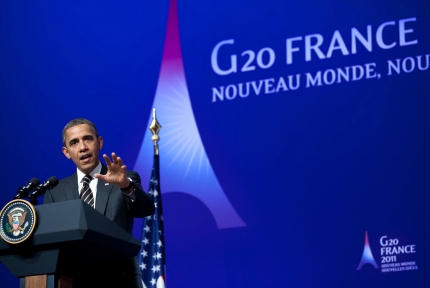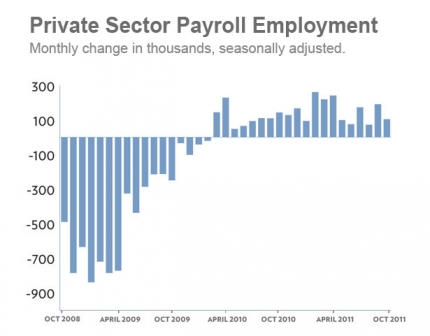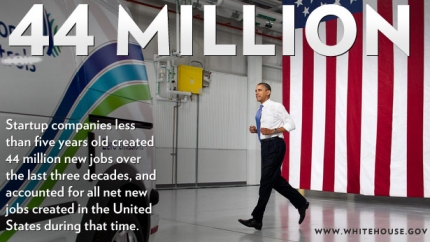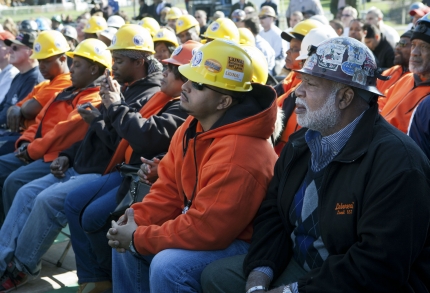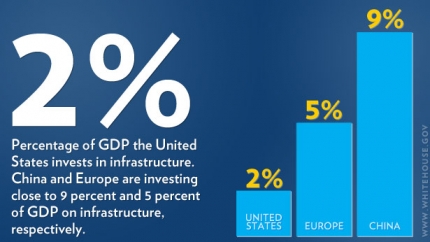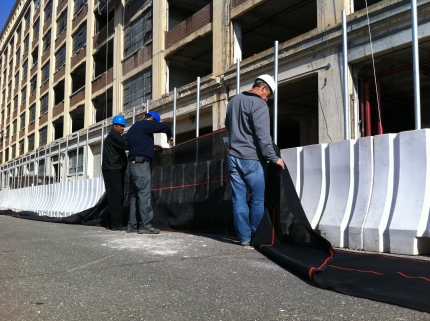Jobs News
Helping Veterans Get Back to Work: John Kamin
Posted by on November 11, 2011 at 7:30 PM EDTWatch Army Veteran John Kamin, here.
John Kamin enlisted in the U.S. Army in 2005, and was deployed to Iraq at the onset of the surge in 2007. He received an honorable discharge after 15 months, but returned to Iraq when he was recalled in 2009. Today Kamin is studying at American University, where he is president of the school’s student veteran group.
In that role, he sees a lot of his fellow veterans struggling to adjust to civilian life, a problem he thinks will grow as we return to a peacetime force. “We are going to be seeing a lot of people get out of the military with a vast array of skill sets and a vast amount of knowledge that, at surface value, does not translate into civilian skills. There is no way to tangibly associate one with the other.”
He says veterans face unique difficulties in transitioning to the civilian job market. “It falls on them to pretty much exploit a skill that the military does not teach you, which is looking out for number one, learning how to self-promote and put yourself out there for events and experiences you hold dear and don’t feel the need to advertise.”
Kamin believes the new initiatives around job training and job search support President Obama announced this week can make a big difference, and he also hopes attention to the challenges transitioning veterans face will help bridge the gap in understanding and set up our returning veterans for success.
Read the story of Navy veteran Eric Smith, who has more than five years experience as a military medic, but works today as a hospital janitor.
Helping Veterans Get Back to Work: Maria Canales
Posted by on November 11, 2011 at 3:00 PM EDTWatch Army Veteran Maria Canales, here.
Maria Canales joined the Army in 2002, when she was 22 years old. First stationed in Germany, the Brooklyn, NY native, served in Iraq from October 2005 through October 2006. Although she left the Army in 2007, Canales did not find a job until October 2011.
Looking for work in the private sector was challenging. “I didn’t really know how they were going to perceive my experience. I could not translate my military skills well enough to get a job offer.” But now that she is working in a related field, Canales is using what she learned in the Army every day.
She says the initiatives announced this week by President Obama – the Veterans Job Bank, My Next Move for Veterans and the Veterans Gold Card – are extremely important.
“Not everyone has a support system, not everyone knows exactly what to do when they come home. They are coming back with lots of uncertainty and don’t know exactly who to reach out to. When we have a plan for them before they get out then we are doing the right thing for every veteran who is coming home.”
Despite the fact that our veterans have unique skills and experiences that make them excellent hires for any civilian business, their unemployment rate tops 12 percent. Read the stories of veterans like Maria who have struggled to transition their skills into new careers and find out why fighting for these heroes is a priority for the Obama Administration.
America's Small Business Owners Can't Wait for Congress To Act
Posted by on November 11, 2011 at 1:30 PM EDTWatch small business owners talk about the American Jobs Act here.
On Thursday, Republicans and Democrats in the Senate did the right thing and voted to pass tax credits that will encourage businesses to hire America’s veterans. A group of business owners who recently met with the White House Business Council say they hope that Congress will pass the other provisions in the American Jobs Act and support their efforts to grow their companies and create jobs in their communities.
Learn more about Economy100,000 New Jobs for Veterans and Military Families
Posted by on November 10, 2011 at 3:03 PM EDTToday, First Lady Michelle Obama was at the U.S. Chamber of Commerce to talk about what private companies are doing to help military families.
She announced that a range of businesses now plan to hire 100,000 veterans and military spouses by 2014. She said that the Veterans Jobs Bank -- launched on Monday -- now hosts more than 550,000 job postings from military-friendly employers.
She told the crowd at the Chamber:
This commitment of 100,000 jobs isn’t about making headlines. These wonderful programs don’t just provide a good opportunity for a press conference. All of these efforts are about upholding our sacred duty to our veterans and their families.
Since Joining Forces got off the ground, 16,000 veterans and spouses have already found new positions.
Later today, the Senate is expected to vote on and approve a provision of the American Jobs Act -- which will offer business a $9,600 tax credit for hiring disabled veterans and create additional tax credits for employers who hire veterans who have spent four weeks or more out of work.
"A Victory for the Middle Class" in Ohio
Posted by on November 9, 2011 at 2:35 PM EDTYesterday was Election Day across the country, and last night, once the results were known, Vice President Joe Biden issued a statement congratulating the people of Ohio for rejecting Issue 2 -- a law that would have stripped public employees of their collective bargaining rights.
The Vice President said:
Tonight the people of Ohio delivered a gigantic victory for the middle class with their overwhelming rejection of a Republican attempt to strip away collective bargaining rights. Fundamental fairness has prevailed. By standing with teachers and firefighters and cops, Ohio has sent a loud and clear message that will be heard all across the country: The middle class will no longer be trampled on. The people of Ohio are to be congratulated.
Press Secretary Jay Carney echoed those thoughts:
The President congratulates the people of Ohio for standing up for workers and defeating efforts to strip away collective bargaining rights, and commends the teachers, firefighters, nurses, police officers, and other workers who took a stand to defend those rights.
In his joint address to Congress to introduce the American Jobs Act, President Obama touched on the importance of collective bargaining -- and why doing away with those rights is not the way to get people back to work:
I reject the idea that we have to strip away collective bargaining rights to compete in a global economy. We shouldn’t be in a race to the bottom, where we try to offer the cheapest labor and the worst pollution standards. America should be in a race to the top. And I believe we can win that race.
The Ohio measure lost in a landslide, with 62 percent of voters choosing to reject the law.
Learn more about Civil Rights, EconomyMore Resources for America’s Veteran-Entrepreneurs and Small Business Owners
Posted by on November 8, 2011 at 12:29 PM EDTEd. Note: Cross-posted with the Small Business Administration blog.
Like many Americans in my generation, my father was a World War II veteran. My life has been shaped and influenced by his service. Now, as Deputy Administrator at the SBA, I am committed to supporting America’s veteran entrepreneurs and business owners as they grow their business and put America back to work.
Just yesterday, I hosted a forum for young veterans on the campus of San Diego State University as part of SBA’s Young Entrepreneurs Series and National Entrepreneurship Month. I was happy to meet so many young veterans who are using the skills and leadership they learned in the military to start and run a business.
We talked about a number of important issues facing veteran-entrepreneurs who are part of America’s small business community. We discussed important American Jobs Act proposals such as the call that President Obama made yesterday for Congress to provide large tax credits to businesses that hire veterans and service-disabled veterans. This is something that everyone can and should support.
Today, we’re putting forth even more ideas to support veteran business owners as they grow and hire with a report from the Interagency Task Force on Veterans Small Business Development, which the President created and I have the honor to chair. The Task Force came up with 18 recommendations across three priority areas:
How To Use the Veteran's Job Bank
Posted by on November 7, 2011 at 7:30 PM EDTWatch an Introduction to the Veteran's Job Bank, here.
The Obama Administration today launched a new tool that is designed to help put our veterans in contact with companies that appreciate their skills, and are eager to hire them. Built in collaboration with some of the country's leading technology companies, this easy to use tool means that veterans are now just a click or two away from career opportunities. Watch this video and find out how you or a veteran you know can get started right now/
Open Innovation for Heroes – Introducing the Veterans Job Bank
Posted by on November 7, 2011 at 3:44 PM EDTToday, the Obama Administration launched the Veterans Job Bank, a new search tool designed to help connect veterans with employers. The Job Bank works by bringing jobs listings directly to veterans—instead of the other way around—via a search widget that provides a single window into the myriad job boards, social media platforms, and corporate employment sites that are currently spread across the Internet.
By the Numbers: 500,000
Posted by on November 7, 2011 at 1:15 PM EDTPresident Obama believes that no veteran should have to fight for a job after fighting for our nation overseas. That’s why he’s introduced a host of new tools to help connect veterans to jobs in the civilian workforce, including the Veterans Job Bank, which has more than 500,000 job listings with private sector employers looking to hire vets.
To launch the Veterans Job Bank, the Obama Administration partnered with leading job search companies to create a new, easy-to-use online service that enables employers to “tag” job postings for veterans. The tool gives users the ability to search for jobs from thousands of military-friendly employers worldwide based on keyword, military occupation code (MOC) and/or location.
Nearly 3 million service members have transitioned back to civilian life, and a million more will join them over the next five years as we end the war in Iraq and wind down the war in Afghanistan. These service members have mastered skills and leadership abilities they couldn’t have learned in any ordinary classroom, and have tremendous talents to offer our nation’s businesses.
President Obama knows we can’t wait to help these heroes and their families. Other initiatives to help get them back to work include:
- The Returning Heroes and Wounded Warrior Tax Credits, two pieces of the American Jobs Act that provide tax credits to businesses that hire veterans.
- My Next Move for Veterans, an online tool that helps veterans match their skills with civilian careers that will put their experience to use
- The Veterans Gold Card, which provides personalized case management and career counseling at any of the 3,000 One-Stop Career Centers around the country
We Can't Wait: Obama Administration Announces New Initiatives to Get Veterans Back to Work
Posted by on November 7, 2011 at 1:00 PM EDTWatch President Obama's full remarks here.
The overall unemployment rate ticked down last month and our economy has added more than 350,000 private sector jobs over the past three months. But, over 850,000 veterans were unemployed as of October and the jobless rate for post-9/11 veterans was 12.1 percent. Having served and defended our nation, it just doesn’t make sense that so many of these well-trained, highly skilled, motivated and disciplined veterans can’t find a job worthy of their incredible talents. As the President has said, "If you can save a life in Afghanistan, you can save a life in an ambulance. If you can oversee millions of dollars of assets in Iraq, you can help a business balance its books here at home."
Ensuring our nation’s veterans get the opportunities they have earned has been one of President Obama’s top priorities as Commander-in-Chief. Having already sent 600,000 veterans back to school on the Post-9/11 GI Bill and having hired over 120,000 veterans into the federal government, this Administration continues to take action to help create job opportunities for veterans.
Today at the White House, leading veterans service organizations joined President Obama to announce their support for the Returning Heroes and Wounded Warrior Tax Credits, two provisions in the American Jobs Act Congress is scheduled to consider this week. The Returning Heroes Tax Credit provides firms that hire unemployed veterans with a maximum credit of $5,600 per veteran, while the Wounded Warriors Tax Credit offers firms that hire veterans with service-connected disabilities a maximum credit of $9,600 per veteran.
The President also announced a series of executive actions that will provide new resources for veterans to translate military experience to the private sector job market, give veterans additional career development support and better identify companies looking to hire veterans. These initiatives include:
Veteran Gold Card:Effective today, post-9/11 veterans will be able to visit dol.gov/vets/goldcard.html to download the Veteran Gold Card, which entitles them to enhanced services including six months of personalized case management, assessments and counseling, at the roughly 3,000 One-Stop Career Centers located across the country. This should help serve the more than 200,000 unemployed post-9/11 veterans. The President directed the Department of Labor to launch this initiative in his August 4, 2011 speech at the Navy Yard.
My Next Move for Veterans: The Department of Labor will launch My Next Move for Veterans (mynextmove.org/vets), a new online resource that allows veterans to enter their military occupation code and discover civilian occupations for which they are well qualified. The site will also include information about salaries, apprenticeships, and other related education and training programs.
Creating a Veterans Job Bank:Today, the Administration launched the Veterans Jobs Bank, at National Resource Directory (NRD.gov), an easy to use tool to help veterans find job postings from companies looking to hire them. It already searches over 500,000 job postings and continues to grow. Additionally, in a few easy steps, companies looking to hire veterans can make sure the job postings on their own websites are part of this Veterans Jobs Bank.
I still believe that all Americans can agree that veterans shouldn’t have to fight for a job once they’ve come home from the fight overseas. While this Administration has been fighting for veterans every day, this week we will commemorate and celebrate Veterans Day. In that spirit, I hope Congress can come together and do the right thing by our nation’s veterans. Together, these initiatives and the tax credits will lower veteran unemployment by increasing hiring, improving resources for veterans to translate their military skills for the civilian workforce, and providing veterans with new tools to aid their search for jobs.
Weekly Address: We Have to Increase the Pace
Posted by on November 5, 2011 at 5:30 AM EDTSpeaking from the University of Pittsburgh, Vice President Biden argues that this month’s jobs numbers demonstrate that Congress should pass the American Jobs Act to strengthen our economy and create jobs right away.
Transcript | Download mp4 | Download mp3
Watch Vice President Biden's full remarks here.
Learn more about EconomyWe Can't Wait to Invest in Our Infrastructure
Posted by on November 4, 2011 at 4:34 PM EDTWatch former Republican Mayor of Meridian Mississippi, John Robert Smith, discuss the importance of investing in our nation's infrastructure here.
John Robert Smith says we can’t wait to invest in our nation's infrastructure. Smith, the former Republican Mayor of Meridian, Mississippi, said that expanding and improving our system of roads, highways, railways, and airports creates jobs for people who need them now as well thriving, well-connected communites and engines of economic growth.
“We can’t walk away from transportation infrastructure investment and expect to ever grow ourselves out of the recession that we’re in today,” he said.
Smith is president of a coalition called Reconnecting America that helps cities and towns make smart investments in transportation infrastructure. He believes that easy access to transportation is critical to because it connects people to their communities and resources like jobs, health care, education, and more. Plus, well-planned infrastructure links towns and cities with other towns and cities, creating a vibrant network of connected communities.
Smith said that infrastructure is “not a red issue, a blue issue, or a Republican issue, or a Democrat, liberal or conservative. It’s about how we connect our people to jobs and our children to their future.
“I was mayor of my hometown in Meridian, Mississippi for 16 years and there I never met a pothole that could identify itself as a Republican or a Democrat. It was an issue to be resolved,” he said. “I want our country to face the transportation infrastructure investment we need today with that same type of approach.”
Read more:
- We can't wait to create jobs
- We can't wait to help businesses grow
- We can't wait to help homeowners refinance their mortgages
- We can't wait to help America's graduates
- We can't wait to put veterans back to work
- We can't wait to reduce prescription drug shortages
Learn more about EconomyProgress at the G-20
Posted by on November 4, 2011 at 3:05 PM EDTWhen world leaders gathered this week in France, they acknowledged that the global economy was facing significant challenges that put recovery from the recession at risk.
The debt crisis in Europe has put stress on the continent's banking system, and countries like Greece and Italy are struggling to restore fiscal order.
In our country, the economy hasn't rebounded how anyone had hoped. We're adding jobs, but not at anywhere near the pace we need, and too many remain out of work.
And in emerging economies, the rate of growth seems to be slowing as continued financial instability in the rest of the world begins to drag these countries down, as well.
To counter these threats, the G20 leaders in France pledged to coordinate actions and policies to reinvigorate the global economy.
And the focus of that coordination? Jobs.
"There's no excuse for inaction," President Obama said in a press conference earlier today. "That's true globally and it's certainly true back home right now."
While European governments were vowing to do everything necessary to ensure the stability of the euro, the United States made a pledge of its own in the G20 action plan:
The US commits to the timely implementation of a package of near-term measures to sustain the recovery, through public investments, tax reforms, and targeted jobs measures, consistent with a credible plan for medium-term fiscal consolidation.
This commitment puts even greater emphasis on the need for Congress to take action on the American Jobs Act.
The world is looking for American leadership, and that's exactly what the President's job proposal is.
Learn more about Economy, Foreign PolicyThe Employment Situation in October
Posted by on November 4, 2011 at 11:46 AM EDTToday’s employment report provides further evidence that the economy is continuing to recover from the worst economic downturn since the Great Depression, but the pace of improvement is not fast enough.
Private sector payrolls increased by 104,000, and overall payroll employment rose by 80,000 in October. The unemployment rate edged down 0.1 percentage point to 9.0 percent, a level that remains unacceptably high. Despite adverse shocks that have created headwinds for economic growth, the economy has added private sector jobs for 20 straight months, for a total of 2.8 million jobs over that period. We need faster economic growth to put more Americans back to work. Today’s report provides further evidence for why it is so important that Congress pass the President’s American Jobs Act to put more money in the paychecks of working and middle class families; to make it easier for small businesses to hire workers; to keep teachers in the classroom; to put construction crews to work rebuilding our nation’s infrastructure; and other measures that will help the economy grow while not adding to the deficit over ten years. The report underscores that one area that remains notably weak is the construction sector. That’s why it is disappointing that the Senate was not able to proceed to the infrastructure part of the American Jobs Act.
Sectors with employment increases included professional and business services (+32,000), leisure and hospitality (+22,000), retail trade (+17,800), health care and social assistance (+16,300), and manufacturing (+5,000). Sectors with employment declines included government (-24,000) and construction (-20,000). State and local governments lost 22,000 jobs and have shed more than 430,000 jobs since February 2010.
The monthly employment and unemployment numbers are volatile and employment estimates are subject to substantial revision. There is no better example than August’s jobs figure, which was initially reported at zero and in the latest revision increased to 104,000. This illustrates why the Administration always stresses it is important not to read too much into any one monthly report.
Learn more about EconomyPresident Obama at the G20
Posted by on November 3, 2011 at 6:53 PM EDTToday, President Obama is in France for a meeting of the G20 -- a gathering of 20 nations that represent the world's most important industrialized economies. In addition to working sessions with the full assembly of leaders, the President also held bilateral talks with French President Nicolas Sarkozy and German Chancellor Angela Merkel.
In his conversation with President Sarkozy, he discussed the focus of this week's talks:
I think it's no surprise that we spent most of our conversation focused on strengthening the global economic recovery so that we are creating jobs for our people and stabilizing the financial markets around the world. The most important aspect of our task over the next two days is to resolve the financial crisis here in Europe. President Sarkozy has shown extraordinary leadership on this issue. I agree with him that the EU has made some important steps towards a comprehensive solution, and that would not have happened without Nicolas's leadership. But here at the G20 we're going to have to flesh out more of the details about how the plan will be fully and decisively implemented.
The President elaborated on that theme in his conversation with Chancellor Merkel:
This is going to be a very busy two days. Central to our discussions at the G20 is how do we achieve greater global growth and put people back to work. That means we’re going to have to resolve the situation here in Europe. And without Angela’s leadership we would not have already made the progress that we’ve seen at the EU meeting on October 27th.
Talks will continue tomorrow.
Learn more about , , Economy, Foreign PolicyBy the Numbers: 44 Million
Posted by on November 3, 2011 at 12:05 PM EDTEntrepreneurs and the businesses they create play a critical role in sparking new industries, expanding our economy, and generating new job growth across the country. Companies less than five yeas old created 44 million new jobs over the last three decades. In fact, these firms accounted for all net new jobs created in the United States during that time. Huge Fortune 500 companies like Apple, FedEx, and Boeing all began as startups from entrepreneurs with big ideas.
Entrepreneurship has long been a cornerstone of America's economic power. Helping entrepreneurs access the capital and support they need to get new businesses off the ground in these tough economic times is one of the most important things we can do to help our economy grow. That's why President Obama included help for entrepreneurs in the American Jobs Act and introduced the Startup America Initiative earlier this year. Both the Jobs Act and the initiative help entrepreneurs cut through regulatory red tape and access the investment capital they need, enabling them to turn new ideas into new businesses and new jobs more quickly and easily. The President also signed the America Invents Act in September of this year to fast-track startups and help them put their products on the market more efficiently. enable them to put their products on the market more quickly.
Learn more about Economy, Startup AmericaFive Facts About a National Infrastructure Bank
Posted by on November 3, 2011 at 11:41 AM EDTYesterday, with the Key Bridge, which connects Washington, DC with Arlington, Virginia, as a backdrop, President Obama discussed the ways that the American Jobs Act will invest in the nation's highways, airports, roads, and bridges -- and create new jobs for construction workers.
Today, the Senate is set to take up one idea that the President touted -- the creation of a national infrastructure bank.
Here's how it would work:
1) Congress would appropriate an initial $10 billion in startup money to capitalize the bank.
2) The new bank would identify transportation, energy, and water infrastructure projects that lack funding, offer a clear benefit for taxpayers, and are worth at least $100 million or $25 million for rural projects.
3) Loans made by the bank would then be matched by private sector investments or money from local governments -- so that the infrastructure bank provides half or less than half the total funding.
4) Each project would generate its own revenues to help ensure repayment of the loan.
5) Decisions would be made by a seven-person board of governors -- of whom, no more than four could be from the same political party -- and a CEO chosen by the President.
One bonus fact: The legislation that would create the bank has serious bipartisan backing -- and the support of both the U.S. Chamber of Commerce and the AFL-CIO.
Learn more about EconomyBy the Numbers: 2 Percent
Posted by on November 2, 2011 at 12:04 PM EDTThe United States is falling behind on investing in the roads, bridges, airports, and transit systems that keep our economy humming. We spend just 2 percent of our GDP on infrastructure projects. Europe and China invest 5 percent and 9 percent of their respective GDPs on developing infrastructure.
Functioning infrastructure provides a critical backbone for a strong economy. Research shows that investments in creating, maintaining, or expanding transportation networks promote efficiency, productivity, and more rapid economic growth.
Today, President Obama is calling on Congress to pass a piece of the American Jobs Act that will invest $50 billion in our nation’s transportation infrastructure and $10 billion in a National Infrastructure Bank. Together, these initiatives will put hundreds of thousands of construction workers back on the job rebuilding our roads, rails, and runways. With 1.1 million constructions workers out of work, we can’t wait to invest in our infrastructure.
Learn more about EconomyFort Monroe Becomes a National Monument
Posted by on November 1, 2011 at 12:07 PM EDTToday is truly an historic day for America as President Obama is announcing the establishment of Fort Monroe National Monument -- a historic fort in Virginia’s Tidewater region that was integral role to the history of slavery, the Civil War, and the U.S. military -- as the 396th unit of the National Park System.
With the strong support of the people of Virginia, from the congressional delegation to Governor McDonnell to Mayor Ward and the citizens of Hampton, President Obama has ensured that this historic fort, a symbol of the long struggle for freedom for African Americans, will be preserved as a national park for generations to come.
This video is no longer available.
Fort Monroe is one of 101 projects that I have highlighted as part of the America’s Great Outdoors initiative, representing what states believe are among the best investments in the nation to support a healthy, active population, conserve wildlife and working lands, and create travel, tourism and outdoor-recreation jobs across the country.
This Thursday at 1:00 pm EDT, we will release the final 50-state report outlining some of the country’s most promising ways to reconnect Americans to the great outdoors. As part of that launch, I’ll be participating in a live web chat, where I will answer your questions about the America’s Great Outdoors initiative, Ft. Monroe National Monument, and how conservation and outdoor recreation initiatives are strong economic engines for our nation’s economy.
Click here (newmedia@ios.doi.gov) to send me your questions in advance or tweet them to me at #askken.
I look forward to answering many of your questions on Thursday at 1:00 pm ET.
Learn more about Civil Rights, EconomyExcess Property Gets New Life, Creates Jobs
Posted by on November 1, 2011 at 10:48 AM EDTRecently, the U.S. General Services Administration joined with New York City officials for the groundbreaking of a project that will transform a former Navy supply warehouse in Brooklyn, built in 1918, into a small business incubator. Once completed, no longer will the nine-story structure represent a vacant excess federal building. It will soon be a hub of activity as approximately 400 construction workers prepare the structure for manufacturing businesses that are anticipated to provide 1,300 permanent jobs in the planned state of the art industrial center.
Last summer, GSA completed the successful sale of this former federal building to the New York City Economic Development Corporation, which had selected a private developer to redevelop the 1.1 million square foot warehouse. The federal government received $10 million through GSA’s negotiated sale to the New York City Economic Development Corporation.
As part of the White House Campaign to Cut Waste, the Obama Administration is moving aggressively on disposal of excess properties such as this one to save taxpayer dollars and make more efficient use of the government’s real estate assets. President Obama has directed federal agencies in a Presidential Memorandum to focus on improving the management of the government’s real estate and getting unneeded properties off our books. Agencies have risen to the challenge and identified opportunities that exceed the President’s goal to realize $3 billion in savings from the government’s properties by September 30, 2012.
With a portfolio including 350 million square feet of public buildings, 200,000 federal vehicles, and a flow of goods and services throughout government totaling $95 billion, GSA is uniquely suited to ensure federal tax dollars are not wasted on properties that are excess to the Federal government’s needs. Since 2002, GSA’s Real Property Utilization and Disposal office, working with all federal landholding agencies, has disposed of over 3,355 unneeded federal properties resulting in over $5.6 billion in proceeds. With our position as the leading federal asset manger, we will continue to work with agencies to aggressively identify and dispose of underutilized buildings to make our government more sustainable and efficient.
The sale of the Brooklyn warehouse to the New York City Economic Development Corporation will deliver jobs to the region while relieving the federal government of a property that has outlived its utility.
To find out more about the federal government’s excess property list visit the White House Excess Property Map or GSA’s Real Property Utilization and Disposal site.
Learn more about Economy, , Fiscal Responsibility
- &lsaquo previous
- …
- 7
- 8
- 9
- 10
- 11
- 12
- 13
- 14
- 15
- …
- next &rsaquo
